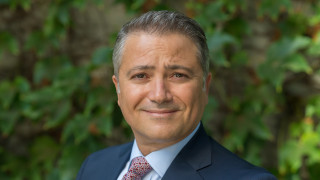Criminal Justice Professor’s Documentary Screened for U.S. Navy Officers
Thursday, November 18, 2021

Established in 1884 as an advanced course of professional study for naval officers, the U.S. Naval War College educates and develops leaders at specific stages in their careers from all services, U.S. government agencies and departments, and international navies. According to the U.S. Department of Defense, which operates the school, "each year, more than 600 outstanding intermediate- and senior-level officers and civilian leaders participate in the 10-month resident program at U.S. Naval War College."
Following the screening, Fazari discussed the major points of the "violentization theory" – the premise of the film – with the audience and applied it to the work of Lt. Colonel Dave Grossman, author of On Combat and On Killing. The event concluded with the audience conveying their deep, personal appreciation for Fazari’s work and the request that he return to the War College.
"I was pleased to see that the film could be of some service to these officers," said Fazari. "They do the important work in sustaining our way of life and so to play a small role in how they view their commitment was an honor and a privilege."
Relating the importance of Fazari's work in the training of Naval Officers, Professor Heath "Hank" Brightman, Ed.D. '00, Acting Director, Civilian Military Humanitarian Response Program within the College of Maritime Operational Warfare at the U.S. Naval War College said, "Why They Kill brilliantly illuminates why the connections between group socialization and mentorship in both the Sailor's personal and professional lives are of such great importance." He continued, "For many young enlisted members and junior commissioned officers, the ship becomes their home and the crew becomes their family. Accordingly, identifying markers for violent behavior during indoctrination into the Navy combat team, along with possible strategies to divert unacceptable candidates prior to gaining them is vital to the future force. When interventions are possible that enhance resilience in our Sailors, both the Navy and the nation reap the benefits by developing a service that is committed long-term to the profession of arms."
Fazari has traveled extensively following a series of invitations to screen the film. Prior to the screening at the Naval War College, the documentary was screened for cadets at West Point and at the World Bank in Washington D.C. as a part of their Global Solutions Group Stability, Peace and Security Lecture Series. At the World Bank, Fazari's perspective was eagerly sought and received given the financial implications of violence and the destabilizing affect it can have on local and national economies. Fazari also recently screened the documentary at the National Association for Court Management annual conference in Las Vegas, Nevada, where he discussed the "phantom community" construct of the film vis-à-vis the court’s role and responsibilities in sentencing defendants.
Why They Kill is based on the critically acclaimed book of the same name written by Pulitzer Prize-winning author Richard Rhodes. The book was based on the research of Seton Hall Criminal Justice Professor Lonnie H. Athens.
The documentary takes an in-depth look at why some men, women, and even children assault, batter, rape, mutilate, and murder through the lens of Professor Athens' breakthrough research and singular theory which the New York Times noted, "offers a commanding perspective on human violence."
Known as the "Violentization Theory," Athens' work uses his interviews with killers as a basis to explain how violent criminals develop, how violent communities are created and transformed, and how violent acts are committed and prevented.
The theory is fleshed out within the documentary through a series of case study dramatizations depicting the stream of consciousness of some of the country's most violent criminals, the homicide detectives who pursue them and the lawyers charged with their prosecution.
Noting that he found the film screening "compelling," Brightman said: "Dr. Fazari's film demonstrates the rare ability to blend images from across cultures and value systems with sound psychological and criminological theories. Indeed, in a clear and relatable way, his work underscores the universality of violentization, while also emphasizing its timeliness in America today."
Already screened at locations throughout the United States and broadcast by Fox TV in Alaska, Why They Kill has become a widespread teaching tool for a number of organizations. In 2022 Fazari is scheduled to screen the documentary for other groups, including the Middle Atlantic States Correctional Association in Atlantic City, New Jersey.
Categories: Arts and Culture






